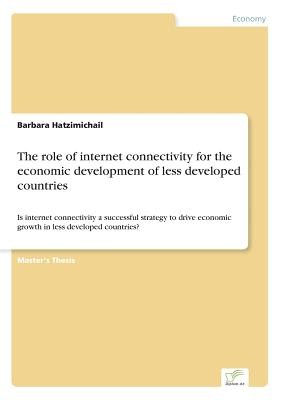
- We will send in 10–14 business days.
- Author: Barbara Hatzimichail
- Publisher: Diplom.de
- Year: 2003
- Pages: 92
- ISBN-10: 3838673484
- ISBN-13: 9783838673486
- Format: 14.8 x 21 x 0.6 cm, softcover
- Language: English
- SAVE -10% with code: EXTRA
The role of internet connectivity for the economic development of less developed countries (e-book) (used book) | bookbook.eu
Reviews
Description
Inhaltsangabe: Abstract: The current wave of globalisation - the trend towards worldwide integration of markets - is spurred by the development of ICTs, including the Internet (Miria Pigato, 2001). But there exists founded concern whether this development reaches Less Developed Countries (LDCs). Technological transformations, such as Information Communication Technology (ICT), open new possibilities in various areas. With a rapid technological development the world faces the challenge to match the pace of technological innovation with national and global policy innovation. This paper will analyse the following hypotheses: 1. Internet connectivity has potential to promote economic growth and support sustainable development for LDCs. 2. The application of the Internet technology carries risks for LDCs. 3. Successful application of Internet technology requires appropriate sustainable policies and strategies. The analysis is based upon literature review of economic and development theories, literature about ICT in development with particular focus on the Internet, country and development related information, and statistical data focussing in particular on South Africa and Uganda. Inhaltsverzeichnis: Table of Contents: INTRODUCTION6 1.OVERVIEW - LITERATURE REVIEW11 2.THE INTERNET AND E-BUSINESS20 2.1Internet20 2.2E-Business21 2.3Internet Connectivity - Indicators22 3.ECONOMIC BENEFITS27 3.1Global proximity, global business networking27 3.2Communication and information retrieval28 3.3E-business opportunities for on-line trade32 4.RELATION BETWEEN ECONOMIC GROWTH AND INTERNET CONNECTIVITY34 4.1South Africa - Regression analysis35 4.2Uganda - Regression analysis38 4.3Comparison South Africa versus Uganda39 5.RISKS AND CONSTRAINTS FOR LDCS41 5.1The Digital Gap / Divide41 5.2Constraints and the widening gap in LDCs43 5.3Barriers and limitations for E-business51 5.4Policies to overcome constraints, barriers and limitations53 6.CONCLUSIONS58 7.APPENDIX60 7.1Appendix - South Afr
EXTRA 10 % discount with code: EXTRA
The promotion ends in 20d.11:07:10
The discount code is valid when purchasing from 10 €. Discounts do not stack.
- Author: Barbara Hatzimichail
- Publisher: Diplom.de
- Year: 2003
- Pages: 92
- ISBN-10: 3838673484
- ISBN-13: 9783838673486
- Format: 14.8 x 21 x 0.6 cm, softcover
- Language: English English
Inhaltsangabe: Abstract: The current wave of globalisation - the trend towards worldwide integration of markets - is spurred by the development of ICTs, including the Internet (Miria Pigato, 2001). But there exists founded concern whether this development reaches Less Developed Countries (LDCs). Technological transformations, such as Information Communication Technology (ICT), open new possibilities in various areas. With a rapid technological development the world faces the challenge to match the pace of technological innovation with national and global policy innovation. This paper will analyse the following hypotheses: 1. Internet connectivity has potential to promote economic growth and support sustainable development for LDCs. 2. The application of the Internet technology carries risks for LDCs. 3. Successful application of Internet technology requires appropriate sustainable policies and strategies. The analysis is based upon literature review of economic and development theories, literature about ICT in development with particular focus on the Internet, country and development related information, and statistical data focussing in particular on South Africa and Uganda. Inhaltsverzeichnis: Table of Contents: INTRODUCTION6 1.OVERVIEW - LITERATURE REVIEW11 2.THE INTERNET AND E-BUSINESS20 2.1Internet20 2.2E-Business21 2.3Internet Connectivity - Indicators22 3.ECONOMIC BENEFITS27 3.1Global proximity, global business networking27 3.2Communication and information retrieval28 3.3E-business opportunities for on-line trade32 4.RELATION BETWEEN ECONOMIC GROWTH AND INTERNET CONNECTIVITY34 4.1South Africa - Regression analysis35 4.2Uganda - Regression analysis38 4.3Comparison South Africa versus Uganda39 5.RISKS AND CONSTRAINTS FOR LDCS41 5.1The Digital Gap / Divide41 5.2Constraints and the widening gap in LDCs43 5.3Barriers and limitations for E-business51 5.4Policies to overcome constraints, barriers and limitations53 6.CONCLUSIONS58 7.APPENDIX60 7.1Appendix - South Afr


Reviews